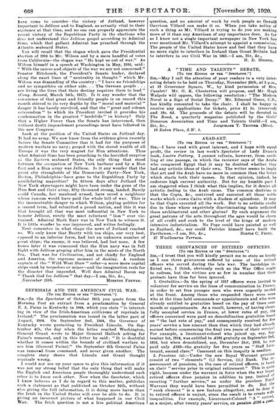REPRISALS AND THE AMERICAN CIVIL WAR. [To raz Enreoa or
THE " Sercriroa.") Sist,—In the Spectator of October 16th you quote from the Morning Post an extract from a proclamation by General E. A. Paine in Kentucky in 1864, which you state "is interest- ing in view of the Irish-American criticisms of reprisals in Ireland." The proclamation was issued in the latter part of August, 1864. On September 2nd, ,1864, the Governor of Kentucky wrote protesting to President Lincoln. On Sep- tember 4th, the day when the letter reached Washington, General 'Grant wrote to- Major General: Hallock asking for Paine's removal, and in this letter he said : "It is doubtful whether it comes within the bounds of civilized warfare to use him (General Paine)." On September 6th General Paine was removed from command, and never given another. The complete story shows that Lincoln and Grant thought reprisals wrong.
I would not use up your space to give this information if it was not my strong belief that the only thing that will make the English and American people thoroughly understand each other is to know each other. Now when the Spectator, which
I know believes as I do in regard to this matter, publishes such a etatement as that published on October 16th, without also giving the full information, it is doing more harm than the Irish in the United States will ever be able to do. It is giving an incorrect picture of what happened in our Civil War. -The Irish question is not a live political American
question, and no amount of work by such people as Oswald Garrison Villard can make it so. When you take notiee of such a thing as Mr. Villard is trying to do you are making more of it than any American of any importance does. As far as I know not a single important newspaper in New York has ever mentioned Mr. Villard's attempt to appoint a commission. The people of the United States know and feel that they have no more right to interfere in Ireland than Great Britain had to interfere in our Civil War in 1861.-1 am, Sir, flic.,
H. E. Hoorea.


































 Previous page
Previous page